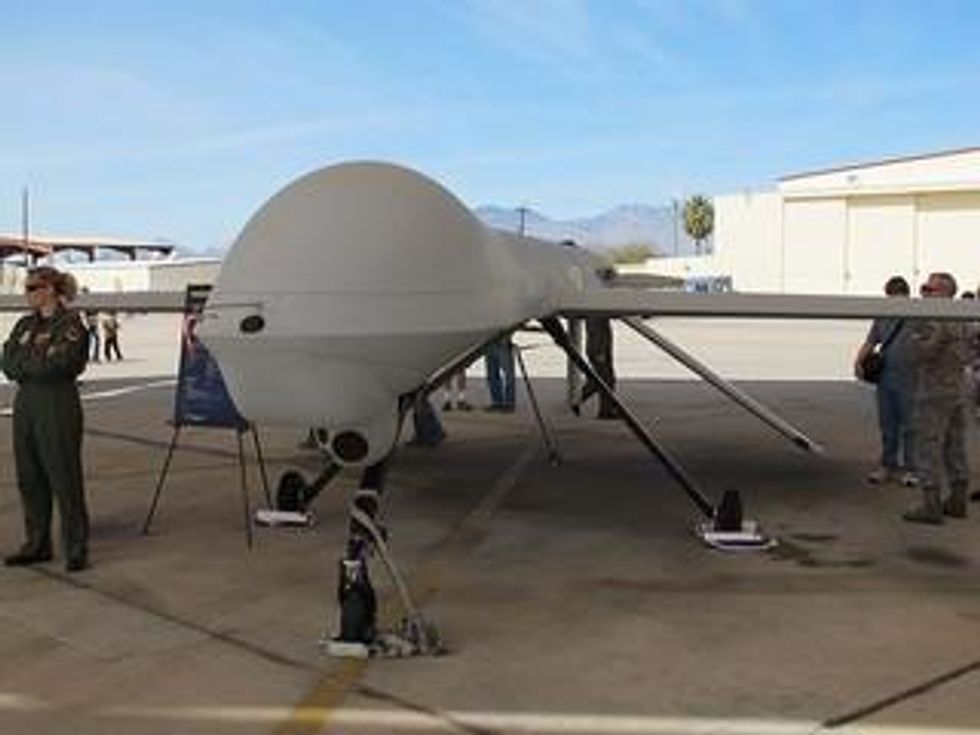The awkward balance that President Barack Obama tried to strike between morality, law, and national security with Thursday's drone speech reveals the major flaw in our era's opaque "war
on terror." More and more, the ends do not justify the means. Indeed, the evidence from today and from history confirms that drone attacks in particular forfeit rather than protect national security.
Obama and supporters of targeted killings argue that drone strikes have benefits. Their unique capabilities have allowed the United States to annihilate the governance of al Qaeda in Afghanistan, they say. The drone program has also limited the operational capacity of al Qaeda members in Pakistan, Yemen, Iraq, and Somalia.
Yet while Obama described drone strikes in the same breath as "a necessary evil," defining unmanned aerial violence as indispensable to U.S. national security is wrongheaded. As Micah Zenko's special report for the Council on Foreign Relations on reforming drone policy notes, the drawbacks actually outweigh the benefits.
Most importantly, targeted killings alienate the United States in international opinion. A joint report by the Stanford International Human Rights Clinic and the New York University Global Justice Clinic, "Living Under Drones," confirms this position. The authors concluded after nine months of interviews not only that drones kill innocent civilians on a regular basis, but that drone policy itself has a broader injurious effect: increased anti-American sentiment in the international community.
Six witnesses discussed the problem at length last month in a Senate hearing. The most poignant testimony came from the Yemeni youth activist Farea al-Muslimi, who described the physical and psychological effect of the bombing of his village in April. When his neighbors think of America, "they think of the terror they feel from the drones that hover over their heads, ready to fire missiles at any time."
Peter Bergen, the director of the New America Foundation and a CNN contributor, told the senators that the "dramatic amplification" of drone attacks under Obama sets a dangerous precedent. Other governments that have obtained drones - including the Chinese, Iranians, or Russians - could easily justify strikes on separatists or nationalists with the simple argument that they are at war. How can future U.S. leaders call on other countries to exercise restraint, when its own use of drones is neither transparent nor accountable?
Historical precedent supports those who argue that extralegal lethal force is not in the national interest. In the mid-1970s, Senator Frank Church's select committee examined the balance between means and ends in U.S. foreign policy. Church famously exposed the CIA as possibly "a rogue elephant rampaging out of control," emphasizing plans from the early 1960s to "neutralize" anti-American leaders like Patrice Lumumba of the Congo, Abdul Kassem of Iraq, and Fidel Castro. The committee also turned to the imprint such activities left. Targeted killings, on an extent far smaller than Zenko's estimated 401 civilian deaths, produced a backlash. The plans were widely perceived not just as illegal, but as immoral.
Moral and legal considerations of U.S. national security are also intertwined with the country's history, but not in a way that Obama would like. In its leaked white paper on drone policy, the Justice Department invoked as precedent the Nixon administration's legal rationale for the invasion of Cambodia in late 1969 and early 1970. A legal adviser provided a post-hoc discussion in a February 1970 report. If a nation-state was unable to prevent "violations of its neutrality" by one side of belligerents in a war, the other side was historically justified in "attacking those enemy forces in that state," he wrote.
The white paper extends the argument. "Transnational non-state organizations" are more diffuse, the Justice Department reasons. Because "terrorist organizations may move their base of operations" from nation to nation, the U.S. government can justly eliminate threats anywhere.
Historians agree that the invasion of Cambodia did little in the long run to ensure the security of Americans, let alone Cambodians.
Congress passed the War Powers Resolution in 1973 in response to the need for greater oversight of presidential war escalation. On Thursday, Obama promised to give Congress that supervisory role. He has also vowed to place the United States at the forefront of an international discussion on the international laws of war.
Bringing the killing program out of its extralegal penumbra is an important step, but promises for a less hazy legal architecture can only go so far. International regulations cannot resolve the more important moral tension in U.S. national security. The national image of the United States was another key theme of the president's speech. But Obama also went to great pains to emphasize that the relative "human cost" to civilians was far less than the death toll of "acts of terrorism against Muslims."
But that kind of conviction means that drone warfare will continue to replicate itself in the United States and elsewhere. And with this, another blow is dealt to the moral authority of U.S. national security.




